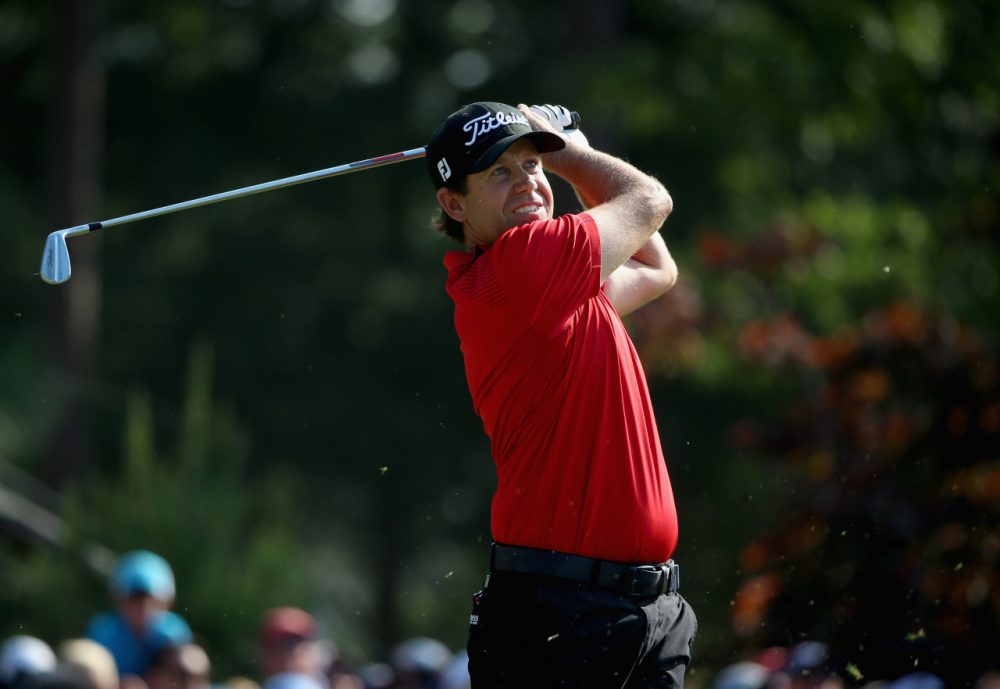Advertisement
U.S. Open Runner Up Erik Compton Thrives After Second Heart Transplant
Resume
At the U.S. Open at Pinehurst in North Carolina last weekend, Erik Compton finished in a tie for second place. Second place in a major championship would be a big deal for most golfers, but isn’t usually big news. But this 34-year-old’s circumstance is unique, as he has come back from his second heart transplant to compete at the tournament level. Compton joined Bill Littlefield.
BL: First of all, congratulations on a great tournament. You were one of just three golfers to finish under par for the whole Open. That must feel pretty good.
EC: Yeah, the par I made on the last whole to finish in the red was very special. The crowds were really behind me at the Open, from the tee box to the green. It was very gratifying, all the hard work I’ve done for such a long time and overcoming so much. For the fans to be behind me and cheering for me was really a special moment for me and my family.
BL: You had your first heart transplant 22 years ago. Tell us about why you needed your first transplant.
"My life-saving transplant, and the fact that I’ve been playing the tour, would not have been done if I didn’t have my donor family with me – they decided to donate their organs."
Erik Compton
EC: I was diagnosed with cardiomyopathy, dilated, at the age of nine, so the heart was slowly weakened and the doctors had to replace my heart in order for me to keep going. That was in 1992. I was 12 years old when I was transplanted at Jackson Memorial Hospital in Miami. I had my first transplant for 17 years, I went to University of Georgia on a golf scholarship, and I turned pro after my sophomore year, having had some success at PGA Tour-level tournaments as an amateur. I had my second transplant at the age of 27.
BL: I want to get to that, because that story of the second transplant is a fairly hairy one – a wild trip to the hospital among other things. Tell us a bit about that day.
EC: I was coming off of playing on the Web.com Tour, and not having the result that I wanted, feeling tired. And I went home and tried to do some more exercise, thinking I was in bad shape. But it was really the heart that was giving out. I ended up having what they call a “widowmaker” heart attack. I had it at the hospital, because I drove myself there, and they were able to get me into the emergency room and I was able to be stented. With a transplanted heart and having so much damage, I needed to have a new heart to be replaced in order to keep going. And I was fortunate to receive another one shortly after that.
BL: How long were you out of golf?
EC: Recovering from the actual heart attack that I had with the first transplant was actually more of a recovery than the actual transplant, because when they did the second transplant I was out walking, and within 14 days I was up and moving around. I decided that I wanted to have a life back in golf, and I went straight back to the tour school six months later. But I was using a cart because I didn’t have the strength, and slowly worked my way back into walking. Now I’m living my dream being out here.
BL: At this point, with the success that you’ve been having, is your training any different than the way anybody else on the tour trains?
EC: I would say no, not really. I mean, I play practice rounds, try to hydrate, and do all the things that most of the guys do. I’m pretty physically fit – when I’m at home I run in the offseason up to an hour without stopping. I might be more fit than some of the other guys.
BL: You’re part of a campaign to raise awareness about the value of organ donation. What do you tell people who are reluctant to become donors?
[sidebar title="Other Great Moments In The U.S. Open" width="630" align="right"] Erik Compton's inspiring effort would certainly have a spot in ‘Great Moments of the U.S. Open’ by Robert Williams and Michael Trostel. Read Bill Littlefield's book review here. [/sidebar]
EC: I just want people to have the same opportunities that I’ve had. My life-saving transplant, and the fact that I’ve been playing the tour, would not have been done if I didn’t have my donor family.
BL: You’ve made the cut at 14 tournaments, you’ve had three top-10 finishes, you’ve tallied more than $1.6 million in earnings – I wonder, given all that you’ve been through, if you could have anticipated that level of success?
EC: Well, I’ve always dreamed of being back with my peers. It’s amazing what you can do when you have your health. Now I have a lot to look forward to. I'm in the Masters next year, I'm in the PGA championship coming up. It's all exciting. A lot of great stuff ahead of us now.
This segment aired on June 21, 2014.